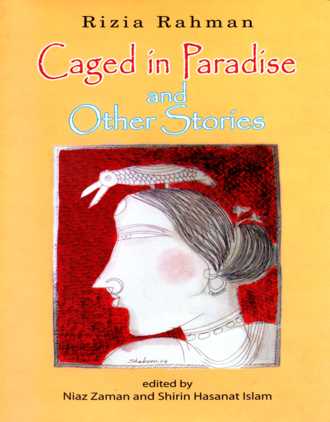Caged in Paradise and Other Stories by Rizia Rahman
Trapped in a terrible beauty

Bangladesh doesn’t normally get noticed by the world.
The tiny size of the country, dwarfed by China above it and almost cuddled protectively on all sides by its mother India, means most people miss it on a map. (In fact, the map I have in front of me doesn’t even have room for the name of the country.) Yet some 160 million inhabitants make Bangladesh roughly the seventh-most populous country in the world. Add to this the fact that Bangladesh ranks as one of the fastest developing countries in Asia, and you’d think people would take notice. They don’t.
Until recently.
A few months ago, a nine-story garment factory in Savar, on the outskirts of the capital city, Dhaka, collapsed with thousands of garment workers inside. Most were young girls, many of these newly married or betrothed or already mothers. Almost all took home to their villages a pittance of a wage to feed their families. More than 1,100 of them died.
I happened to be just a few miles away when the tragedy occurred. I watched live broadcasts on the TV with horror, cameras poking into holes where the dead and dying lay. Thousands of rescuers clawed their way into the rubble. Much more brutally honest than Western reporting, Bangladeshi cameras left nothing to the imagination. Horror on an unprecedented scale unfolded before our eyes.
I wept. This is not the Bangladesh I am used to. I’ve lived here for five years. I know this as a beautiful country with wonderful, friendly, welcoming people. A “paradise” if you like, earning a perfect title in Bangladeshi author Rizia Rahman’s collection of short stories, Caged in Paradise. This book powerfully describes life for more than 100 million poor, rurally based Bangladeshis. The author genuinely seems to understand this country is a heavenly place to live, but it can also turn hard and hellish.
One of Bangladesh’s top writers and novelists, Rahman has published stories here and abroad for more than 30 years. She won the country’s top literary award, the Bangla Academy Award, in 1978, then other prestigious awards for the next 20 years. The stories of Caged in Paradise appeared originally in Bangla—the state language—but the collection’s editors, Niaz Zaman and Shirin Hasanat Islam, compiled an excellent team of translators for a wider, English-speaking, audience. These stories present voices that deserve hearing…else, like the girls at Savar, no one will ever hear them.
Bangladesh is a country born in turmoil, a land full of contradictions. For the whole of this year the opposition political party has been trying to oust the ruling party by inflicting hartals, nationwide strikes, on the country. These bring work to a halt day after day, crippling some businesses. Elections await, and the Bangladesh National Party wants a “caretaker government” installed to ensure safe and democratic elections. The ruling Awami League will have none of it.
Hartals inevitably end in bloodshed. Although well used to them, I found that Rahman’s “A Hartal Story” sheds new light on the real reasons for these strikes (“if people like us don’t die in the Hartals, they can’t win the game”) and their effect on the poor—supposedly the very ones these strikes support and defend.
The story focuses on beggars living in Dhaka who can’t earn any money—not even selling matchboxes to passing motorists—because everyone has deserted the streets. (You do not drive on a hartal day if you want to keep your car in one piece.) The poor suffer most from the reality of these strikes. “Hartals never harm them,” says Jamila, a street prostitute in the story, in reference to the rich. “It is street people like us who starve or get hit by bullets or killed by bombs.”
Most living in Bangladesh have known poverty and this leads to strange ambitions by those who begin to claw their way out of it. In the opening story “The Lure of the Sea,” Rahman tells us of an elderly couple, Benu and Altaf. Benu dreams simply to visit the seaside at Cox’s Bazar—famed for having the world’s longest continuous beach but rarely visited by non-Bangladeshis. Her obsession begins when her husband brings her a gift—a calendar.
-

-

-

-

-

-

-

-

-

-

-

-

-

-

-

-

-

-

-

-

-

-

-

-

-

-

-

-

-

-

-

-

-

-

-

-

-

-

-

-








































